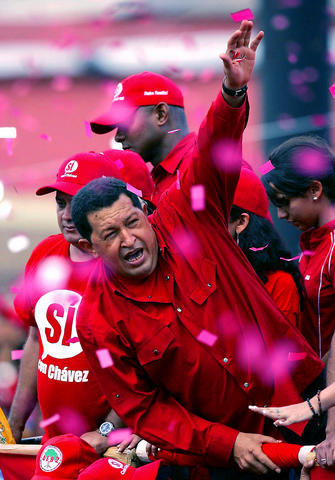AP, CARACAS
Venezuelan President Hugo Chavez said his government could deny permits for opposition-led protests because of violence during demonstrations against proposed constitutional amendments that would let him run for re-election indefinitely.
"The next time they announce one of these marches, we'll have to evaluate whether to grant permission," Chavez told thousands of supporters during a rally on Sunday in favor of the reforms.

PHOTO: AP
He accused his opponents of planning to spur widespread political upheaval ahead of the Dec. 2 referendum on the 69 proposed constitutional changes.
"We're not going to allow them to fill Venezuela's streets with blood," Chavez said.
Human rights groups, the Roman Catholic Church and other critics say Chavez is seeking the changes in order to consolidate power, pointing to the proposed elimination of presidential term limits. Opponents warn that amendments allowing authorities to detain citizens without charge and censor the media during a state of emergency would violate civil liberties.
The president's stern warning came in response to violence last week during street demonstrations by university students protesting the proposed constitutional overhaul. On Friday, two students were killed and four others were injured by gunfire during a protest outside a university in the western state of Zulia.
Chavez condemned the killings and urged political rivals to settle their differences democratically. University students plan more protests this week.
Opposition leader Leopoldo Lopez said Venezuelans would continue protesting against the sweeping reforms, but called for peaceful demonstrations.
"There won't be any police, National Guard troops or armies capable of stopping the country's transformation," he said. "They won't be able to stop Venezuelans who want democracy."
The reforms were overwhelmingly approved last week by the National Assembly, which is controlled by the president's allies. Chavez -- a former paratroop commander who was first elected in 1998 -- denies the amendments threaten freedoms.
The amendments would also give Chavez the power to create provinces governed by federally appointed officials, allow the government to expropriate private property without having to first seek court authorization, create new types of property managed by cooperatives, end the Central Bank's autonomy and extend presidential terms from six to seven years.
Chavez, who won re-election last year with promises to transform Venezuela into a socialist state, says the changes would actually expand democracy by empowering neighborhood-based assemblies.
"It's power for the people," he told cheering supporters. "That's the essence of the constitutional reform."
Venezuela -- a major supplier of oil to the US -- is deeply divided over Chavez's rule, with government opponents fearing an impending dictatorship. But a weak opposition has repeatedly failed to derail his initiatives at the ballot box.
Waving flags and wearing the red of Chavez's ruling party, thousands of "Chavistas" -- as the president's backers call themselves -- shouted pro-reform slogans in a march that stretched for several kilometers before reaching Sunday's rally in downtown Caracas, where Chavez greeted them.

EUROPEAN FUTURE? Albanian Prime Minister Edi Rama says only he could secure EU membership, but challenges remain in dealing with corruption and a brain drain Albanian Prime Minister Edi Rama seeks to win an unprecedented fourth term, pledging to finally take the country into the EU and turn it into a hot tourist destination with some help from the Trump family. The artist-turned-politician has been pitching Albania as a trendy coastal destination, which has helped to drive up tourism arrivals to a record 11 million last year. US President Donald Trump’s son-in-law, Jared Kushner, also joined in the rush, pledging to invest US$1.4 billion to turn a largely deserted island into a luxurious getaway. Rama is expected to win another term after yesterday’s vote. The vote would

FRAUD ALLEGED: The leader of an opposition alliance made allegations of electoral irregularities and called for a protest in Tirana as European leaders are to meet Albanian Prime Minister Edi Rama’s Socialist Party scored a large victory in parliamentary elections, securing him his fourth term, official results showed late on Tuesday. The Socialist Party won 52.1 percent of the vote on Sunday compared with 34.2 percent for an alliance of opposition parties led by his main rival Sali Berisha, according to results released by the Albanian Central Election Commission. Diaspora votes have yet to be counted, but according to initial results, Rama was also leading there. According to projections, the Socialist Party could have more lawmakers than in 2021 elections. At the time, it won 74 seats in the

CANCER: Jose Mujica earned the moniker ‘world’s poorest president’ for giving away much of his salary and living a simple life on his farm, with his wife and dog Tributes poured in on Tuesday from across Latin America following the death of former Uruguayan president Jose “Pepe” Mujica, an ex-guerrilla fighter revered by the left for his humility and progressive politics. He was 89. Mujica, who spent a dozen years behind bars for revolutionary activity, lost his battle against cancer after announcing in January that the disease had spread and he would stop treatment. “With deep sorrow, we announce the passing of our comrade Pepe Mujica. President, activist, guide and leader. We will miss you greatly, old friend,” Uruguayan President Yamandu Orsi wrote on X. “Pepe, eternal,” a cyclist shouted out minutes later,

Myanmar’s junta chief met Chinese President Xi Jinping (習近平) for the first time since seizing power, state media reported yesterday, the highest-level meeting with a key ally for the internationally sanctioned military leader. Senior General Min Aung Hlaing led a military coup in 2021, overthrowing Myanmar’s brief experiment with democracy and plunging the nation into civil war. In the four years since, his armed forces have battled dozens of ethnic armed groups and rebel militias — some with close links to China — opposed to its rule. The conflict has seen Min Aung Hlaing draw condemnation from rights groups and pursued by the